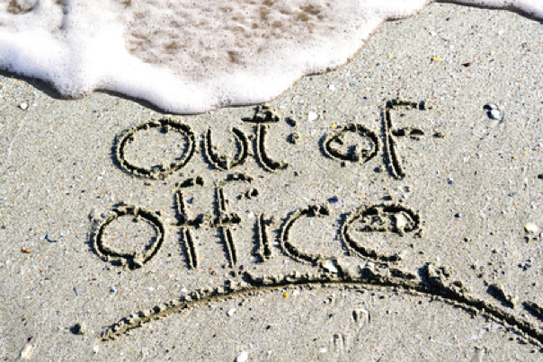 Praise enhances performance, effort and engagement in the classroom and the workplace. But is your praise having the desired effect? Tom Finley, Assistant Editor of Edutopia, drawing on multiple studies of praise, says that encouraging words must be differentiated from “super-astonishing, spectacular hype”. If you want your praise to resonate:
What is a memorable piece of praise you have received, and how did it motivate you? What is the most effective praise you have given? To join the conversation, click "comments" above. If you would like to read more about creating a habit around masterful communication, check out our book: Be Quiet, Be Heard: The Paradox of Persuasion
2 Comments
 As holiday vacations approach, it’s time for friends, family, feasts, and… out of office auto replies. Is there a good way to say, “Hey, I’m trying to unplug; so don’t expect a prompt reply?” (Tweet it!) Writing for The New York Times “Smarter Living” column, Tom Herrera asked readers to suggest ways of saying ”Sorry, I’m outta here.” Of course there is the generic, “I’ll be back next week, meanwhile call so-and-so”, or the no-frills “Back on Tuesday, January 1,” but consider these: Tembi Secrist, who works in exporting, writes, “Thank you for your email! I am on vacation. Vacations are not for checking email, so I won’t be doing that. Fortunately, we rarely encounter life and death situations in the world of exporting, and aren’t we all glad for that?” Stephanie Grace, who Herrera says “wins for cutest auto-reply” brought a smile to all with the irresistible…“I’m out of office enjoying a weeklong backpacking trip in the Wallowas with the best adventure pup in the world, Lucy: https://www.instagram.com/luseatosky/” What's your favorite out of office auto reply? To join the conversation, click "comments" above. If you would like to read more about creating a habit around masterful communication, check out our book: Be Quiet, Be Heard: The Paradox of Persuasion  From wedding toasts to sales presentations to job interviews, situations where we are the focus of attention tend to generate churning stomachs and pounding hearts. Not even elite actors, athletes, and musicians are immune from performance anxiety—although many use it as fuel and thrive as the stakes rise. “Research in this area has led to a number of insights that we can all use, whether we want to handle pressure more effectively in our professional lives, or simply get the better of our golf buddies,” writes Noa Kageyama, Ph.D., performance psychologist at the prestigious Julliard School (http://bit.ly/2AkfbyF).
What kinds of performance situations make you anxious and what do you do to handle your jitters? To join the conversation, click "comments" above. If you would like to read more about creating a habit around masterful communication, check out our book: Be Quiet, Be Heard: The Paradox of Persuasion.  It’s hard to apologize because “human beings are wired for defensiveness.” So says psychologist Harriet Lerner, author of the new book Why Won't You Apologize?: Healing Big Betrayals and Everyday Hurts. In a recent NPR interview, Lerner addressed that special subgenre of apology—the sexual harassment apology—so ubiquitous of late. The rules for this kind of mea culpa, she says, are essentially the same as for any good apology.
Lerner says that good apologies are important but they're not enough. Apologies do not excuse perpetrators from the consequences of their actions (Tweet it!). Have you ever been on the receiving end of a sexual harassment apology? How did you feel? If you have not, what do you believe such an apology should include? To join the conversation, click "comments" on our Community of Practice Forum. If you would like to read more about creating a habit around masterful communication, check out our book: Be Quiet, Be Heard: The Paradox of Persuasion. |
Archives
July 2024
Categories
All
|
|
Glaser & Associates, Inc.
Executive Offices 1740 Craigmont Avenue, Eugene, OR 97405 541-343-7575 | 800-980-0321 [email protected] |
© 2019 Glaser & Associates. All Rights Reserved.


 RSS Feed
RSS Feed